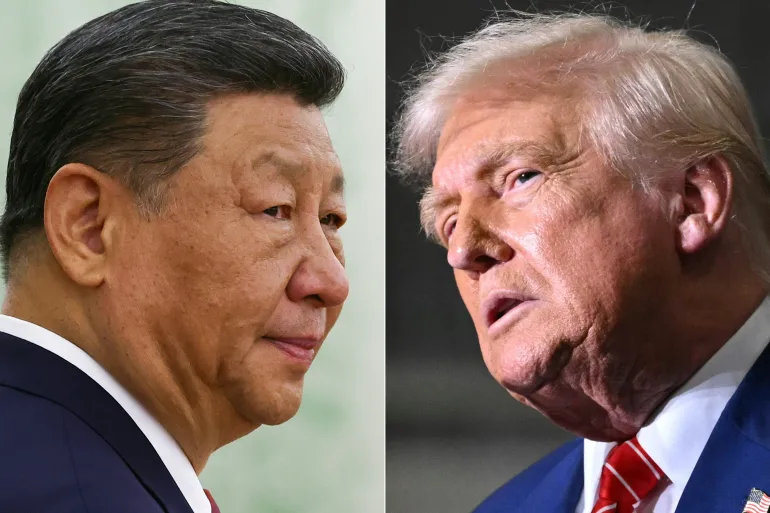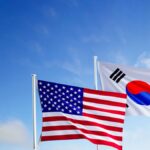Table of Contents
In a crucial move to address the ongoing tensions between the United States and China, President Donald Trump has announced a second round of trade talks with China. The announcement follows a phone call with Chinese President Xi Jinping, which aimed to reduce the escalating tariff war between the world’s two largest economies.
Why the Trade Talks Matter
The trade conflict between the United States and China has been one of the most significant global economic issues in recent years. With tariffs reaching as high as 145 percent, the battle has caused disruptions in global supply chains, heightened trade tensions, and created uncertainty for businesses across both countries and beyond. This new round of talks, scheduled for Monday in London, aims to address some of these issues. Trump’s announcement came shortly after his phone conversation with Xi, which seemed to provide a temporary moment of calm amid a flurry of disputes. The trade talks will involve a team of senior US officials, including Treasury Secretary Scott Bessent, Commerce Secretary Howard Lutnick, and Trade Representative Jamieson Greer, who will meet with their Chinese counterparts to try to resolve these persistent issues.

The Tariff War So Far
The trade war began earlier this year when President Trump launched a series of tariffs aimed at reducing the US trade deficit with China. The tariffs, which have seen increases as high as 145 percent on some Chinese goods, were a direct response to what the US government claimed were unfair Chinese trade practices, including intellectual property theft, forced technology transfers, and unfair subsidies. In retaliation, China imposed its tariffs, with some reaching up to 125 percent. However, following negotiations in Geneva last month, both countries agreed to a temporary pause on the highest tariffs, with US tariffs cooling to 30 percent and Chinese tariffs dropping to 10 percent. Despite this temporary ceasefire, Trump’s administration has continued to express dissatisfaction with China’s actions. Specifically, the US has accused China of violating the temporary agreement by slowing the approval of exports of rare earth minerals, critical resources used in the production of technology, which has raised concerns among US businesses.

What’s at Stake in the Talks?
The upcoming trade talks come with several pressing issues that both sides need to address, including
1. Tariffs and Trade Barriers
The primary focus of the talks will likely remain on tariffs, with both sides trying to negotiate a long-term resolution. The temporary tariff relief is set to expire in August, and both countries are under pressure to strike a deal before the deadline. If the trade conflict reignites, it could further disrupt global trade.
2. Rare Earth Minerals
A significant point of contention is China’s control over rare earth minerals, which are vital for the production of many high-tech products, from smartphones to electric vehicles. China has been accused of limiting exports of these minerals in a strategic move to leverage its position in the trade war.
3. Taiwan and Fentanyl Trafficking
The US has raised concerns about China’s stance on Taiwan, a democratically governed island that Beijing considers part of its territory. Tensions over Taiwan have been a recurring issue in US-China relations. Additionally, the US has accused China of being lax in its efforts to curb the trafficking of fentanyl, a synthetic opioid that has contributed to the opioid crisis in the US.
4. Visa Revocations and Diplomatic Relations
One of the other key issues in this trade spat has been the revocation of student visas for Chinese students studying in the United States. In his phone call with Trump, President Xi reportedly requested the removal of what he referred to as “negative measures,” a reference to the visa restrictions placed on Chinese students in the US, which has strained diplomatic relations.

A Difficult Road Ahead
Despite the optimism following the phone call between Trump and Xi, both leaders have acknowledged the complexity of the negotiations. Trump himself described Xi as “very tough and extremely hard to make a deal with,” reflecting the ongoing challenges both sides face in finding common ground.

What’s Next for the US-China Trade Relationship?
While the upcoming talks could lead to a breakthrough, experts remain cautious. With complex economic issues on the table, such as trade imbalances, intellectual property theft, and geopolitical tensions over Taiwan, resolving the differences may take longer than expected. Trump’s aggressive stance on trade with China has sparked both support and criticism in the US. Some argue that tougher tariffs are necessary to protect US industries from Chinese competition, while others believe that the tariffs have harmed American consumers and businesses. As the talks approach, the world will be watching closely. The outcome of these discussions could shape not only the future of US-China relations but also the broader global economy.

Conclusion: A Delicate Negotiation
With both sides locked in a trade dispute that has reverberated globally, the new round of trade talks between President Trump and President Xi will be crucial in determining the future of US-China relations. Despite temporary halts to the tariff war, key issues like rare earth minerals, Taiwan, and visa revocations remain unresolved, making a swift agreement unlikely. Nevertheless, the outcome of this next round of talks could have far-reaching consequences for the future of global trade and diplomacy.
Author Profile
- Syed Tahir Abbas is a Master's student at Southwest University, Chongqing, specializing in international relations and sustainable development. His research focuses on U.S.-China diplomacy, global geopolitics, and the role of education in shaping international policies. Syed has contributed to academic discussions on political dynamics, economic growth, and sustainable energy, aiming to offer fresh insights into global affairs.
Latest entries
 Japanese PoliticsSeptember 6, 2025Prince Hisahito’s Coming-of-Age and Japan’s Male-Only Succession Dilemma
Japanese PoliticsSeptember 6, 2025Prince Hisahito’s Coming-of-Age and Japan’s Male-Only Succession Dilemma GeopoliticsAugust 23, 2025Previewing the White House Visit of South Korean President Lee Jae Myung
GeopoliticsAugust 23, 2025Previewing the White House Visit of South Korean President Lee Jae Myung Middle East ConflictJuly 22, 2025Israel’s Deadly Attacks on Gaza: A Dire Humanitarian Crisis and International Calls for a Truce
Middle East ConflictJuly 22, 2025Israel’s Deadly Attacks on Gaza: A Dire Humanitarian Crisis and International Calls for a Truce Middle East & North AfricaJuly 20, 2025Israel Targets Damascus Amid Rising Tensions in Syria
Middle East & North AfricaJuly 20, 2025Israel Targets Damascus Amid Rising Tensions in Syria

